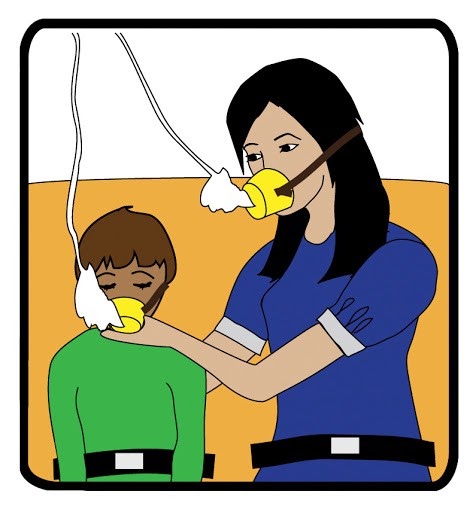PARENTS
Put your own mask on first!

Research shows that when parents manage their own stress levels and feel more relaxed, kids do better and are more resilient in coping after a potentially traumatic event. Even before children are old enough to fully understand what is going on in the world, they can tell when their parents or caregivers are feeling anxious. Especially during stressful or uncertain times, it is important to check in with yourself. How are you coping? Have you been able to reach out to a friend or take a few minutes to meditate? Take advantage of free mindfulness and meditation resources available during the COVID-19 pandemic.
The Child Mind Institute is offering a collection of resources to help you take care of yourself and your family during COVID-19, including daily Facebook live video chats with clinicians.
The National Child Traumatic Stress Network (NCTSN) has put together a guide to help you stay on top of what you need to know about the coronavirus to keep yourself and your family safe, how you can make space for your own self-care, and help your children cope. NCTSN recommends using this handbook to understand and manage your own thoughts and feelings.
If you are still finding it challenging to cope, reaching out to your doctor may help you get more information on how you can best take care of yourself during this time.
How to talk to your kids about coronavirus

You may be wondering how you can answer your child's questions about COVID-19 without causing them to worry or panic. Experts say that having a conversation about difficult topics can actually help lessen worry in kids of all ages. Start the conversation by asking your child what they know about the coronavirus. This will allow you to correct inaccurate information that they may have heard.
Check out these general principles to follow when talking with kids about COVID-19, from the Centers for Disease Control and Prevention. The NCTSN has also put together a resource to help you initiate a productive conversation and support your child.
Depending on how old your child is and how your family has been affected by the pandemic, you can find specific guidance online for how to talk about COVID-19 with your child. Check out this comic or this book that you can use to help explain the coronavirus to young children.
Parenting during shelter-in-place: Experts say routine is your best friend
With your kids at home seven days a week, you may be starting to feel like things are getting out of control. If you are finding it hard to keep your child busy or entertained throughout the day, experts suggest that sticking to a routine is the way to go.
Learn how you can create and stick to a routine that works for you and your child during shelter-in-place.
Check out experts' advice on how to help your child maintain a consistent sleep schedule during shelter-in-place and why it is especially important during uncertain times.
How to support your kids with distance learning

If you are finding it challenging to keep your child engaged and motivated to learn while school is closed or delivering remote instruction, you are not alone. Experts have shared some tips for successful remote learning during shelter-in-place. You can find tools online to help your child set realistic goals and share their successes and strategies with your child's teacher. Remember, you are not in this alone.
The NewSchools Venture Fund has compiled a list of resources that you can access for free during this time, including sample daily schedules, reading and math lessons, and printable at home packets for different age groups.
When to get help
Experts have suggested that parenting strategies such as maintaining routines, flexible expectations, modeling positive behaviors, and encouraging social communication via technology can make a huge positive difference in outcomes for children and adolescents during shelter-in-place.
However, if you do not notice an improvement or you feel that your child's symptoms are persisting, it may be a good idea to reach out to your child's doctor or a professional at school for support. Experts have identified some signs that may indicate that your child could benefit from additional support.
HELPFUL RESOURCES
For parents of preschool-aged children:
Early Trauma Treatment Network: How to help young children feel safe and heal
Resources for preschool or kindergarten-aged children
Sesame Street: Soothing and Comforting
For parents of elementary schoolers:
Book for children on understanding and coping with the coronavirus
National Child Traumatic Stress Network: Parent Tips for Helping School-Age Children After Disasters
For parents of teens:
Greater Good Magazine: How to help teens shelter in place
NYU Langone: Checking in on your teenager's mood during COVID-19
Psychology Today: Understanding adolescent stress during social distancing
Resources for middle and high school students
Thrive Global: Helping teens handle COVID-19 with RESPECT
UNICEF: How teenagers can protect their mental health during COVID-19
More resources:
CDC: Helping Children Cope With Disasters
Child Mind Institute: Signs and Symptoms of Mental Health Problems in Children and Adolescents
Healthy Children: How to create a family media plan to limit screen time
InfoAboutKids: Helping kids stay motivated for learning during social distancing
NCTSN: Simple activities to do with your kids at home
NYU Langone Health: Guide to parenting during the COVID-19 pandemic
Sesame Street: Self-Care for Parents
UNICEF: How to keep your child safe online while stuck at home
